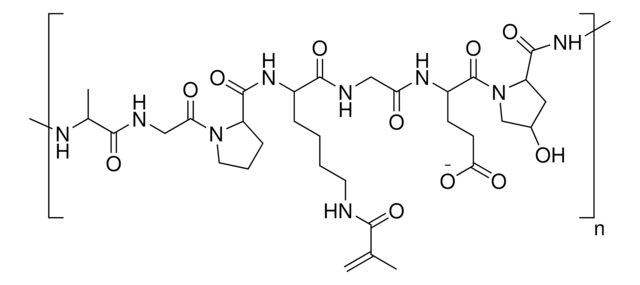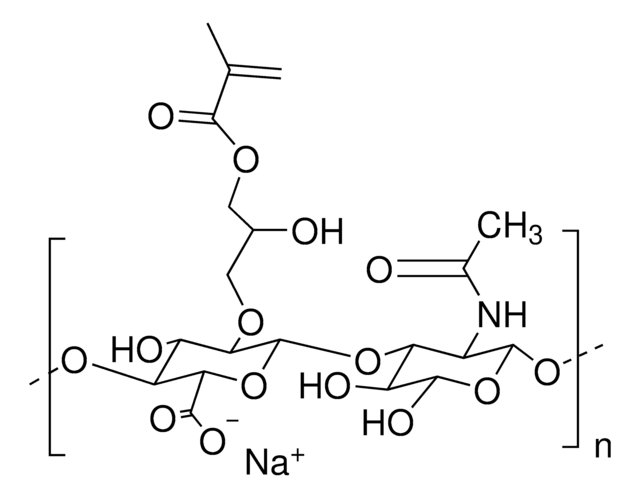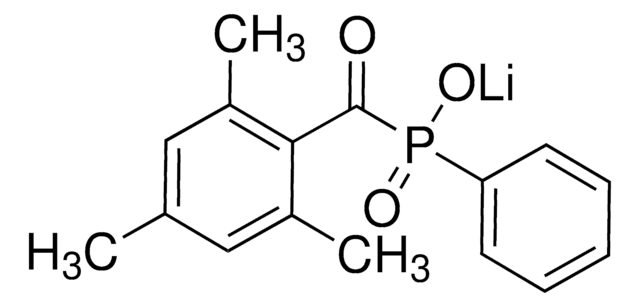918636
Low endotoxin GelMA solution
gel strength 300 (bloom), degree of substitution 80%, 0.2 μm, sterile-filtered, GelMA Type B
Sinônimo(s):
GelMA, Gelatin methacrylamide, Gelatin methacrylate, Gelatin methacryloyl
Faça loginpara ver os preços organizacionais e de contrato
About This Item
Código UNSPSC:
12352202
NACRES:
NA.23
Produtos recomendados
Nível de qualidade
esterilidade
sterile-filtered
forma
viscous liquid
concentração
20 wt. % in DPBS (buffer)
Impurezas
≤5 CFU/g Bioburden (Fungal)
≤5 CFU/g Bioburden(Aerobic)
<25 EU/mL Endotoxin
cor
colorless to pale yellow
tamanho de partícula
0.2 μm
pH
6.5-7.5
temperatura de armazenamento
−20°C
Aplicação
Low endotoxin GelMA solution is a 20% low endotoxin gelatin methacrylate (GelMA) solution in DPBS buffer. It is sterile filtrated through 0.2 μm sterile filter, and ready to be used in biomedical applications.
GelMA can be used to form hydrogels for tissue engineering and 3D bioprinting. Gelatin methacryloyl (GelMA) is a polymerizable hydrogel material derived from natural extracellular matrix (ECM) components. Due to its low cost, abundance, and retention of natural cell binding motifs, gelatin has become a highly sought material for tissue engineering applications. The addition of photocrosslinkable methacrylamide functional groups in GelMA allows the synthesis of biocompatible, biodegradable, and non-immunogenic hydrogels that are stable in biologically relevant conditions and promote cell adhesion, spreading, and proliferation.
GelMA can be used to form hydrogels for tissue engineering and 3D bioprinting. Gelatin methacryloyl (GelMA) is a polymerizable hydrogel material derived from natural extracellular matrix (ECM) components. Due to its low cost, abundance, and retention of natural cell binding motifs, gelatin has become a highly sought material for tissue engineering applications. The addition of photocrosslinkable methacrylamide functional groups in GelMA allows the synthesis of biocompatible, biodegradable, and non-immunogenic hydrogels that are stable in biologically relevant conditions and promote cell adhesion, spreading, and proliferation.
Embalagem
10 mL in glass bottle
Código de classe de armazenamento
10 - Combustible liquids
Classe de risco de água (WGK)
WGK 3
Escolha uma das versões mais recentes:
Certificados de análise (COA)
Lot/Batch Number
Lamentamos, não temos COA para este produto disponíveis online no momento.
Se precisar de ajuda, entre em contato Atendimento ao cliente
Já possui este produto?
Encontre a documentação dos produtos que você adquiriu recentemente na biblioteca de documentos.
Preparation and characterization of gelatin-poly(methacrylic acid) interpenetrating polymeric network hydrogels as a pH-sensitive delivery system for glipizide.
Gupta V N, et al.
Indian Journal of Pharmaceutical Sciences, 69(1), 64-68 (2007)
Xin Zhao et al.
Advanced healthcare materials, 5(1), 108-118 (2015-04-17)
Natural hydrogels are promising scaffolds to engineer epidermis. Currently, natural hydrogels used to support epidermal regeneration are mainly collagen- or gelatin-based, which mimic the natural dermal extracellular matrix but often suffer from insufficient and uncontrollable mechanical and degradation properties. In
Jason W Nichol et al.
Biomaterials, 31(21), 5536-5544 (2010-04-27)
The cellular microenvironment plays an integral role in improving the function of microengineered tissues. Control of the microarchitecture in engineered tissues can be achieved through photopatterning of cell-laden hydrogels. However, despite high pattern fidelity of photopolymerizable hydrogels, many such materials
Anh H Nguyen et al.
Acta biomaterialia, 13, 101-110 (2014-12-03)
Gelatin has been commonly used as a delivery vehicle for various biomolecules for tissue engineering and regenerative medicine applications due to its simple fabrication methods, inherent electrostatic binding properties, and proteolytic degradability. Compared to traditional chemical cross-linking methods, such as
Chaenyung Cha et al.
Biomacromolecules, 15(1), 283-290 (2013-12-19)
Microfabrication technology provides a highly versatile platform for engineering hydrogels used in biomedical applications with high-resolution control and injectability. Herein, we present a strategy of microfluidics-assisted fabrication photo-cross-linkable gelatin microgels, coupled with providing protective silica hydrogel layer on the microgel
Nossa equipe de cientistas tem experiência em todas as áreas de pesquisa, incluindo Life Sciences, ciência de materiais, síntese química, cromatografia, química analítica e muitas outras.
Entre em contato com a assistência técnica



